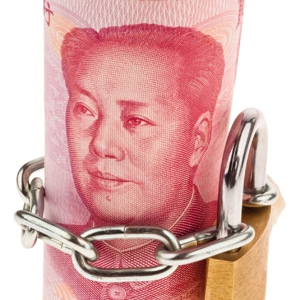
Stricter capital controls by Chinese authorities are prompting concerns that the liberalization of the Chinese capital market is being halted at a time when the US dollar’s strength and a steady outflow of funds from the country are causing the renminbi to slide.
Following a drop of the renminbi to its lowest level in more than eight years, the People’s Bank of China began market interventions in November to buy the currency and to sharply limit corporate customers’ ability to process foreign exchange transactions in Shanghai and Hong Kong, news agencies reported. Customers insisting on buying foreign currency were restricted to $1 million.
The State Administration of Foreign Exchange has also started reviewing transfers abroad of $5 million or more, down from $50 million previously, stepping up scrutiny of direct investments abroad.
The measures, approved after the US presidential elections that boosted the dollar, had some immediate impact, but analysts and traders expect the slide of the renminbi to resume soon.
“It all started with the devaluation in August 2015, which prompted more people to want to bring money abroad,” says Shaun Rein, founder and managing director of China Market Research Group in Shanghai. Now that the yuan has lost 6% in the last 12 months, everybody wants to bring money abroad, and the government has put on capital controls.”
Economists and traders say the measures adopted are attempts to keep the currency slide under control and to curb Chinese companies’ shopping spree for foreign companies. In the past two years, Chinese companies have been buying up groups around the world. While the biggest deal—ChemChina’s $43 billion cash bid for Swiss seed and pesticide company Syngenta—was blocked, many other smaller deals went ahead. For example, AMC Entertainment, a US chain owned by Chinese conglomerate Dalian Wanda, bought the British Odeon & UCI Cinema Group in November in a deal worth $1.2 billion.
“The main new rule is on direct investments,” says Julian Evans-Pritchard, Capital Economics’s China economist in Singapore. “I think that there are two reasons for it. First, they try to slow capital outflows—and direct investments have been the biggest source of capital outflows in the last six months. The other reason is that some companies engaged in some dubious overseas deals, and there is some concern about that.”
Other existing capital rules have become stricter as China attempts to calm the currency markets. The rule that limits each individual to export only $50,000 per year, for example, used to be overcome simply by wealthy individuals’ presenting a certain number of IDs in the family to justify the desired amount of currency abroad. This is no longer an option.
“I do not see the sinister side that people see,” says Patrick Bennett, a Hong Kong–based strategist at Canadian Imperial Bank of Commerce. “In many countries, if you have to bring more than $10,000 overseas, you have to fill out forms and say what it’s for. Sometimes China has been demonized for something that is more or less standard practice everywhere else on the planet.”



